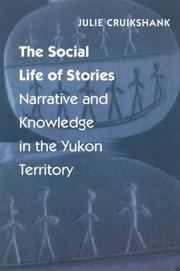| Listing 1 - 1 of 1 |
Sort by
|

ISBN: 9780803214903 0803214901 9780803264090 0803264097 Year: 2000 Publisher: Lincoln: University of Nebraska press,
Abstract | Keywords | Export | Availability | Bookmark
 Loading...
Loading...Choose an application
- Reference Manager
- EndNote
- RefWorks (Direct export to RefWorks)
In this theoretically sophisticated study of indigenous oral narratives, Julie Cruikshank moves beyond the text to explore the social significance of storytelling. Circumpolar Native peoples today experience strikingly different and often competing systems of narrative and knowledge. These systems include traditional oral stories; the authoritative, literate voice of the modern state; and the narrative forms used by academic disciplines to represent them to outsiders. Pressured by other systems of narrative and truth, how do Native peoples use their stories and find them still meaningful in the late twentieth century? Why does storytelling continue to thrive? What can anthropologists learn from the structure and performance of indigenous narratives to become better academic storytellers themselves? Cruikshank addresses these questions by deftly blending the stories gathered from her own fieldwork with interdisciplinary theoretical perspectives on dialogue and storytelling, including the insights of Walter Benjamin, Mikhail Bakhtin, and Harold Innis. Her analysis reveals the many ways in which the artistry and structure of storytelling mediate between social action and local knowledge in indigenous northern communities. Julie Cruikshank is a professor of anthropology at the University of British Columbia. She is the author of Life Lived Like a Story: Life Stories of Three Yukon Native Elders (Nebraska 1990), winner of the 1992 MacDonald Prize.
Indians of North America --- Oral tradition --- Storytelling
| Listing 1 - 1 of 1 |
Sort by
|

 Search
Search Feedback
Feedback About UniCat
About UniCat  Help
Help News
News